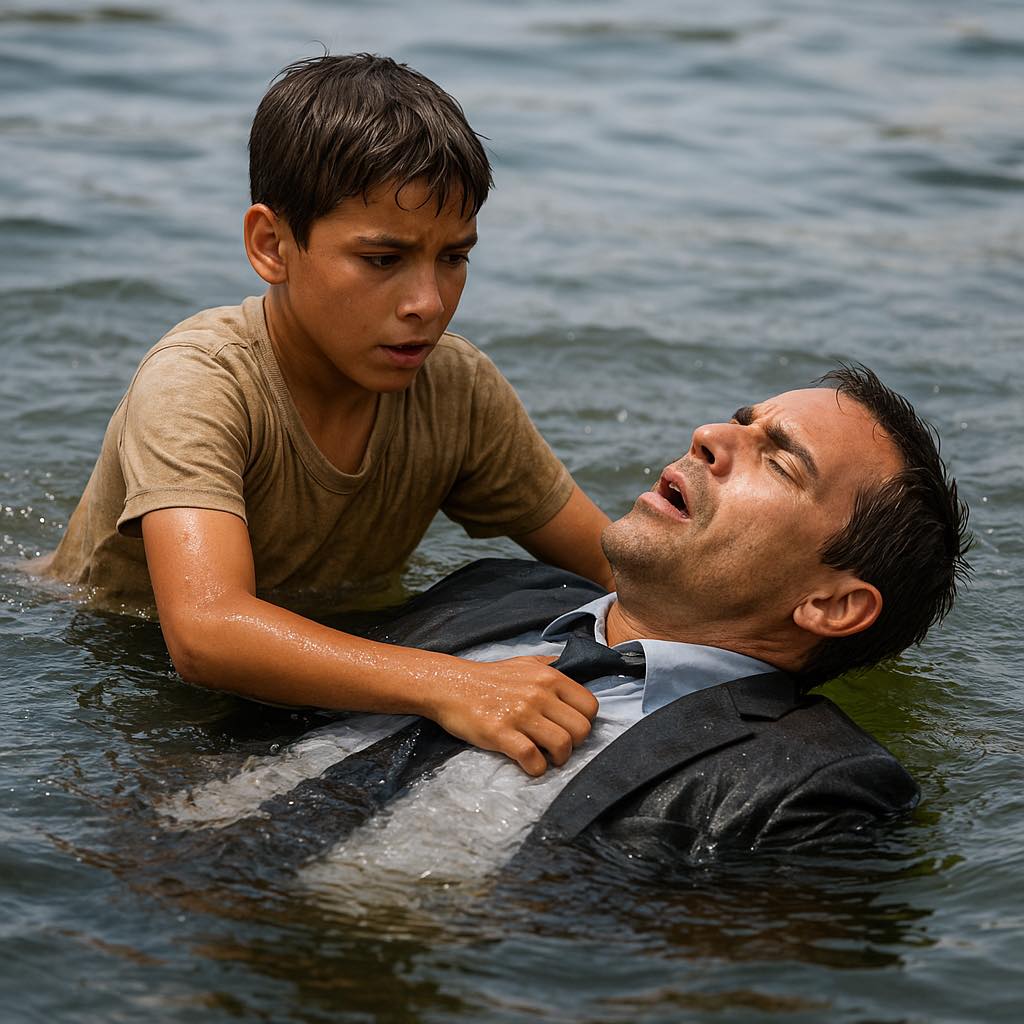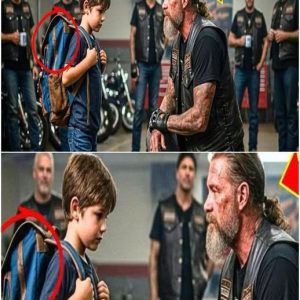When Aurelio, just 12 years old, saw the man in the expensive suit falling into the river, he didn’t know that his act of bravery would change not only the life of the most powerful millionaire in the city but also his own destiny forever.
The midday sun beat down mercilessly on the streets of Ciudad de Esperanza as Aurelio Mendoza walked barefoot along the riverfront, searching for empty bottles he could sell. His torn clothes and dust-streaked face could not hide the determination shining in his dark eyes.
He had been living on the streets for three months, ever since his grandmother Esperanza —the only family he had ever known— had died, leaving him without even enough money for a proper burial.
Unlike other street children who survived by begging or stealing, Aurelio had found his own way to endure. He collected recyclables, cleaned windshields at traffic lights, and, on lucky days, helped carry goods at the central market.
He lived by the moral code his grandmother had instilled in him:
—“My son, poverty is no excuse to lose your dignity. There’s always an honest way to earn your bread.”
It was a Wednesday afternoon when everything changed.
Aurelio was rummaging through garbage bins near the San Rafael Bridge —the city’s most luxurious, where the wealthiest drove their fancy cars and strolled by without ever noticing him.
He had just found several aluminum cans when he heard raised voices coming from above.
—“I told you to pay me what you owe, Salvarrieta!” shouted a harsh voice.
—“Please, give me more time! I can get the money. I just need one more week,” pleaded another voice, refined and educated in tone.
Aurelio crept closer cautiously. From his position beneath the bridge, he could see the shadows of three men projected against the water. He immediately recognized the kind of situation unfolding. He had seen enough debt collections in his short life on the streets to know this would not end well.
—“There’s no more time!” roared the first voice. “Either you pay me now, or your family finds out what you’ve really been doing with your company’s money.”
The man with the refined voice was Maximilian Salvarrieta, 45 years old, heir to one of the country’s greatest fortunes. What no one knew was that behind his façade as a respectable businessman, Maximilian had been hiding a gambling addiction for years.
He had lost millions in underground casinos, and now the loan sharks were collecting.
—“Listen to me, Romano,” Maximilian said, trying to remain composed. “My company is worth hundreds of millions. I’ll pay you with interest, but I need time to liquidate assets without my family finding out.”
Romano Vázquez was the kind of man who built his empire on fear and violence. His cold eyes showed no mercy as he stepped closer to Maximilian.
—“Time’s up, rich man. Either you hand over the 5 million you owe me right now, or your wife receives some very interesting photos of you in my casinos.”
—“You can’t do that.” Maximilian backed up against the bridge’s railing. “I can’t.”
Romano laughed cruelly.
—“Do you know what happens to rich men when they lose everything? They become exactly like the beggars they despise.”
Aurelio felt his heart pound faster. He knew that look in Romano’s eyes. He had seen it before in dangerous men on the streets. Something terrible was about to happen.
—“Maybe you need a cold bath to clear your head,” Romano sneered, signaling to his accomplice.
—“No, wait!” Maximilian shouted, but it was already too late.
The two men shoved him hard against the railing…

Maximilian’s scream was swallowed by the rush of the river as he plunged into the dark water below. Romano and his accomplice laughed once before disappearing into their car, their tires screeching as they sped off.
Aurelio dropped his bag of cans and ran. Without a second thought, the boy dove into the current.
The water was freezing, murky, and strong, but he could see the faint outline of the man struggling, his arms flailing helplessly. Aurelio kicked harder, grabbed Maximilian’s collar, and, with every ounce of strength in his small frame, dragged him toward the muddy bank.
When they reached the shore, Maximilian collapsed, coughing violently. Aurelio patted his back until he finally caught his breath.
“Easy, señor. You’re safe now,” Aurelio gasped, his voice trembling.
The drenched millionaire stared at him, disbelief and shame mixing in his eyes. “You… you saved me.”
Aurelio nodded simply. “Anyone would’ve done the same.”
But Maximilian knew that wasn’t true. In his world, people didn’t risk their lives for strangers — especially not barefoot children with nothing to gain.
He looked at the boy again, at his thin arms, his torn clothes, his eyes far too old for twelve. Something inside him cracked open — a part of his heart that had been buried under years of greed and self-destruction.
“Where are your parents?” he asked softly.
“They’re gone,” Aurelio said. “Just me now.”
Maximilian fell silent. The irony hit him — a man drowning in money had been saved by a boy drowning in poverty.
The next day, Aurelio was taken to the hospital under Maximilian’s name. When he woke, a doctor told him the man who had nearly died had paid all his bills and was waiting to see him.
Outside the window, Maximilian stood in a fresh suit, holding a simple pair of shoes and a school uniform.
“I owed someone a second chance,” he said quietly. “Now I think I know who deserves it.”
From that day on, Aurelio Mendoza’s life changed. Maximilian adopted him, not as charity, but as gratitude — the kind born from redemption.
Years later, people would speak of the partnership between Maximilian Salvarrieta and Aurelio Mendoza — the billionaire and the boy who saved him — who built schools, shelters, and foundations across Ciudad de Esperanza.
And every year, on the anniversary of that stormy afternoon, they returned to the same riverbank. Maximilian would place a hand on Aurelio’s shoulder and whisper the same words:
“That day, I thought I was drowning in the river. But truth is, I was drowning long before — in my own sins. You didn’t just save my life, Aurelio. You saved my soul.”





